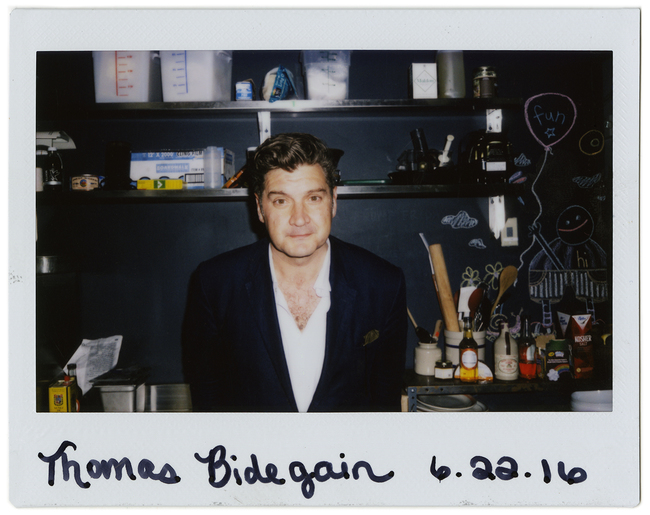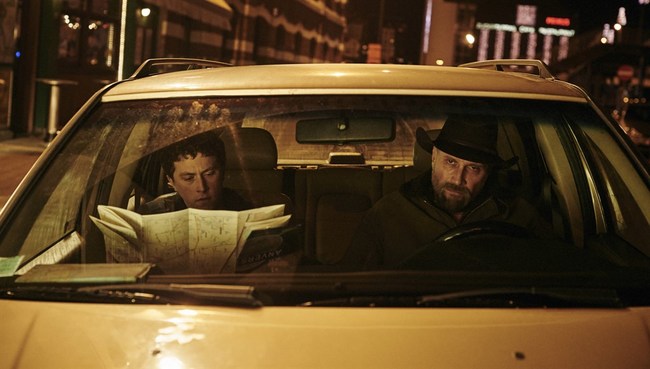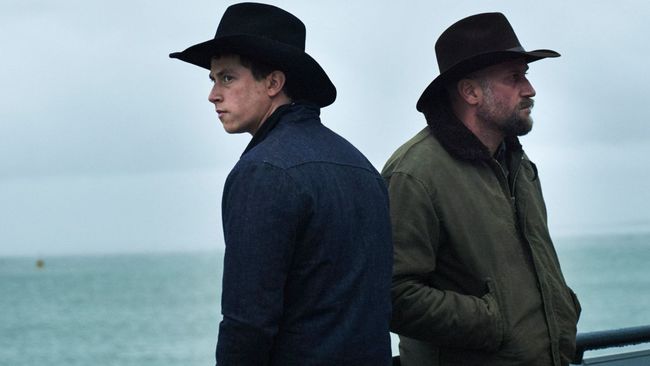Thomas Bidegain’s Cinema Obsessions

Screenwriter and director Thomas Bidegain recently stopped by Criterion for a visit while in town for the theatrical release of his debut feature, Les cowboys. Bidegain began his career working in distribution and as a producer before he moved into screenwriting, penning films for such luminaries as Jacques Audiard (the Oscar-nominated A Prophet and the Palme d’Or–winning Dheepan) and Bertrand Bonello, with whom he cowrote the script for the visionary work Saint Laurent. With Les cowboys, his foray into directing, Bidegain draws on his lifelong love of American films and cinematic traditions of yore to evoke John Ford’s epic western The Searchers within the context of contemporary France. The film centers on Alain, a country-and-western-loving father (played by actor François Damiens) whose daughter vanishes after eloping with her Muslim boyfriend—and Alain’s quest to find her crosses decades, generations, and continents.
I sat down with Bidegain to learn more about the origins of Les cowboys, the differing experiences of being a screenwriter and a director, and his voracious consumption of cinema.
Can you tell me the first film that made you want to make movies?
For me it’s The Night of the Hunter. I make films because my best friend in kindergarten—and we’re still friends—his mother was an usher in a repertory theater in Paris. So from the age of nine to twenty I went to see every film there. They would show American films from the 1920s to the late ’60s, basically the big studio films and some independents, a lot of musicals and a lot of westerns. So I have a very classical American cinephilia. Raoul Walsh was my favorite director when I was a kid, and I love Michael Curtiz. A lot of people say, “Oh, Steven Spielberg,” and I say, “No, Michael Curtiz!”
I remember I saw a screening of The Night of the Hunter at four o’clock, then I stayed and saw it at six o’clock, then I stayed and saw it at eight o’clock—I saw it three times in a row. I was blown away by this film. A lot of the films that I’ve written have something to do with that.
And what’s your connection to John Ford’s The Searchers?
I really liked westerns, and The Searchers was really a starting point for Les cowboys. There have been a lot of takes on The Searchers; in the ’70s Hardcore was one of them, even Taxi Driver. And there’s that thing with westerns in general where they always give you a state of the nation, a moment in time in America. And that’s also what we were trying to do, to give a state of our nation and the community that we are depicting in Les cowboys.

It’s interesting to hear you talk about your interest in American cinema and culture, which mirrors obsessions the characters in the film have with cultures outside their own. How did you approach that theme in your writing?
I think we’re very lucky to make films in Europe, because a lot of things have not been represented. In a film, if you enter a bar in Brooklyn, that’s been done so many times—you know exactly who’s who and what language they’re going to speak and who’s the nice guy, who’s the drunk, who’s the mafioso, because it’s been represented. If you do the same scene in Antwerp, they will speak different languages, and you will have no idea who’s who, and then there’s more to tell. I think we’re lucky to make stories in Europe because of that. Let’s say someone makes a remake of Les cowboys, if they do it with a guy in a ten-gallon hat in Wyoming, it’s redundant. You do it over there and it’s strange. Those communities are plenty in Switzerland, Belgium, in France, and even in England, all the northern part of Europe. There are plenty of people with that Americana; it’s a dream.
Like Dennis Hopper says in Wim Wenders’s The American Friend, there’s nothing wrong with a cowboy in Hamburg.
Exactly. It started because a friend of mine gave me a book of photographs of people in the Rhône Valley in Switzerland who dress up like cowboys, and it was very surprising. I immediately thought, “Oh, you could do something modern with that, if something happened to those people.”
Do you think your experience working in numerous different sectors of the film industry—distribution, production, writing—has informed your directing?
I’ve been a lousy producer, an okay distributor, and then one day I started to write and it worked. But I really believed that being a distributor helped me as a writer, because when you’re a distributor, you ask yourself, “Why would people pay fifteen bucks to go and see that film?” Even before you have the story, it is very interesting to ask yourself that question—it really helped me. Some directors just don’t ask themselves these questions. But I also think it demystifies the process somehow, so it’s easier. Jacques [Audiard] and I talk a lot about films, not only when we write stories and screenplays, but before we get to the story, we talk a lot about the film itself: what’s the film, what’s the promise of the film? When we wrote Dheepan, we had one idea: You will never see a guy selling roses at your dinner table the same way. So how do we do that? Then we talk about the film and find the story.
Because you’ve been a collaborator to a lot of great directors, were you consciously trying to differentiate yourself from their work with this film?
No, because when you’re a director you do what you can. I found out that directing a film is really a machine of revealing yourself. You can hide easily when you’re a screenwriter, and especially if you work with good directors—and I’ve been lucky to work with Bertrand Bonello, Jacques Audiard . . . When you direct a film, for all the decisions you make, and you make so many, you don’t think, “What would Jacques Audiard do, or what would John Ford have done?” You decide, okay, this glass is going to go here or here, and you should not sit like that. All these decisions say something about you, and at the end of the day it reveals something. I’ve learned so much about myself through directing a film.
Do you get a different enjoyment from the process of directing?
It’s a very different thing. Jacques told me right before I went to shoot the film, he said, “You will see that writing is a job, and directing is a state of mind.” And it’s really like that. You have to put yourself in a certain state, and it’s all about the energy you have and how you pass it on to other people. Writing is a bit different; writing a screenplay is rewriting, so it’s about thinking about the film itself and trying to do that.
Did you specifically choose this story as the one to tell for your first film?
Not really. When I had the idea, when it came together, I immediately thought it was for me, because of the form, and because that’s where I’m coming from, in terms of cinephilia and that classic form. I thought, “No, this is my song, I have to sing it.” I don’t think you know where the story comes from, exactly, but you recognize it—and I recognized, oh, I’m going to have to do that. Also, I wanted to work with actors. That’s really the thing that drove me into directing, because you can write things or rewrite them forty times, but there are things you cannot put on the page, and you’ve got to whisper something in the ear of an actor and everything will be different.

François Damiens is well-known for his work in comedy, and this was the first time he really had a tough role, but it was great to modify this silhouette and make him like a John Wayne type of guy and make him good-looking. It’s a genre film, and in genre films you need heroes, and heroes need silhouettes—they need to have a look, and they also need to be a sexual proposition, that’s how you recognize them. For the kid, it was different, because I had to look for it; it did not exist before. I saw so many young actors, and it was a long process. But Finnegan [Oldfield] had something very mysterious in him, so when I saw that mystery, I thought of course this is what I need.
And then there’s John C. Reilly, who has made a lot of really interesting choices lately as an actor.
He doesn’t play a bounty hunter that often. His secret plan is to become a European film star. He was in The Lobster and also Tale of Tales—he had three films in Cannes last year. But it was great to have John, especially when we shot in India with him. I’d never been to India, and horse-riding in the middle of nowhere, it was really a lot of fun. For that character we needed someone who was so sympathetic that that kid would want to follow him.
In terms of the politics of the film, how much were you thinking about what’s going on in the world at this moment, and how much were you just looking to tell the story of an outsider?
It was really a principle as we were writing, and even during shooting, that the story be told through the eyes of the characters. When they don’t understand something, we don’t understand, and when they don’t see something, we don’t see it; really the audience sees what they see, the point of view was very strict. If you do it like that, then you can tell a very intimate story that will tell you something about the world, because every little detail will count. It’s always told at the level of the character, and this allows you not to be judgmental; you’re inside the story with them.
How do you find a balance between writing for yourself and writing for other directors?
I would love to keep on doing both, because it’s a different pleasure, really. I’ve been lucky to work with great directors, and you learn so much, and the process is very nice. You sit in a room and you invent a world and see how it works, and it’s really great, I enjoy that.
I really believe that cinema is a collective sport. When you’re directing, you’re directing, and you’re the boss definitely, but still, there are four or five people who make a film, and I really believe in collaboration.
What was the last film you saw that you really loved?
The last film I saw is one I’ve seen a lot: La belle équipe by Julien Duvivier, a film from 1936 with Jean Gabin. It’s really a great film, and Duvivier is a great director. I watch a lot of modern films too; I watch a film every day. This morning I watched Burn After Reading—I hadn’t seen that movie in a while.
Do you go to repertory theatres a lot?
I go to repertory houses in Paris—we’re very lucky about that, which is great. La belle équipe I saw in a theater. I saw another Duvivier with Michel Simon from a Georges Simenon novel, Panic. And I’m one of those guys that still buys DVDs. And with Jacques, when we write, we exchange so many films.
Is watching movies a big part of your process together?
Yeah, and a lot of the time we go away for a week, and we work during the day and bring movies that are related to the thing we’re working on, so we always have references.



